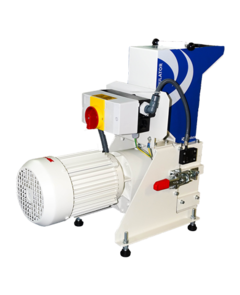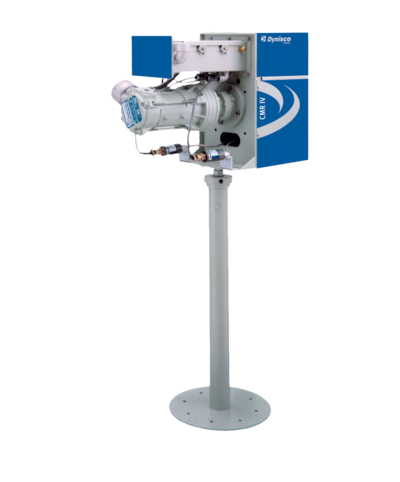
CMR IV - Rheometer
Specifically designed for the thermoplastics resin industry, the Dynisco CMR series can be configured to measure melt flow rate, high/low load melt flow rate, apparent viscosities, or to perform other customer defined tests.The CMR system consists of two parts: a rheometer head connected directly to the process which samples, conditions, and measures the melt flow of the resin, and an RCU (Rheometer Control Unit) that controls the CMR test parameters (temperature, pressure, rate), and provides outputs of computed results, and communications to an external distributed control system when required.
Features:
• On-line melt flow rate correlated to ASTM D1238
• On-line apparent viscosities
• Data exchange by analog and digital input/outputs
• Customer specified solutions
• Systems for hazardous locations
• Compact measuring head for close extruder connection
• Dynisco Vertex® Mercury Free Pressure Transducers forhigh accuracy
• A range of metering pump sizes for specific applications
• Simple ”in the field“ calibration
• Alarm system for malfunctions
• Rugged industrial designDynisco
CMR IV - Rheometer - Measurement of rheological parameters in real time
Inquiry system
Configure your own product according to your requirements and needs. If you are unsure of the configuration, provide us in the notes the necessary information about the existing sensor or product, even a competitor. We will be happy to help you find an alternative Dynisco product. If your request is urgent, let us know. We will do our best to help you resolve this situation to your satisfaction as quickly as possible. If we have all the information, we are able to offer a model with minor differences, which is in stock and you can have another product available the next day.
If you need more information do not hesitate to contact us.
Dynisco Configuration Code:
Online Rheological Measurement Experience the Benefits of Online Rheology Measurement
CMR IV

The rheometer samples molten polymer from the process through a heated transfer line. A metering pump then drives the polymer melt through a capillary die of accurate diameter and L/D ratio, at a precisely controlled rate. The pressure drop across the die is measured by a Vertex Mercury Free pressure transducer. When the system is run at constant pressure (shear stress) and the flow rate is determined, a continuous measurement of the MFR is obtained. A wide range of accurate inter-changeable capillaries provide the system with high resolution and a broad range of capabilities.
CMR IV - RCU: ULTIMATE PERFORMANCE

Our high performance RCU combines the rheological properties of a Laboratory Capillary Rheometer with MFI readings delivered by a Melt Flow Indexer. It has been updated with a Siemens S7-1500 PLC with a Siemens 7” (178mm), Comfort Panel Touch Screen HMI. This combi-nation provides increased processing power and hi-end graphics enabling the RCU to provide +/- .5% Full Scale Accuracy. This allows the RCU to better align measure-ments with those taken from laboratory instruments. Furthermore, it is certified for hazardous environments as needed. The RCU will allow for up to 7 analog outputs and 8 digital outputs- see more information in specification chart.
CMR IV e-RCU: PERFORMANCE SIMPLIFIED

The CMR IV e-RCU offers a simplified PLC with the digital and analog I/O that most plants would need for a cost effective approach to measuring online rheology. It has a Siemens S7-1200 PLC with a Siemens 7” (178mm) Comfort Panel Touch Screen HMI. This combination provides the system with processing power and hi-end graphics allowing the e-RCU to provide +/- 2% Full Scale Accuracy. The e-RCU provides the processor the ability to measure Melt Flow Ratio, Relative Viscosity, Intrinsic Viscosity, and Melt Viscosity in typical end-user environ-ments. All of which create a cost-effective system that reduces the risk of failure to an acceptable level. If con-ditions change and the system is needed in a hazardous and/or classified location, compatibility with the standard RCU allows for an easy upgrade. The e-RCU will allow for up to 2 analog outputs and 2 digital outputs- see more information in specification chart Experience the Benefits of Online Rheology Measurement
PERFORMANCE CHARACTERISTICS
| Melt Flow Index |
0.02 - 5000 g/10 min |
| Viscosity Range |
10 - 105 Pa.S |
| Shear Stress |
150 - 1.5 x 105 Pa |
| Shear Rate |
1 to 7500 s-1 (standard sensor) Maximum 50,000 (special sensor) |
Dies
|
|
| Viscosity |
1 - 5mm, 10 do 30:1 L/D |
| Melt Flow Index |
3.8182:1 L/D |
| Special Dies |
Na życzenie |
| Pressure Range |
3 x 105 – 3.5 x 107 Pa |
| Metering Pump |
0.16 cm3 / RPM (standard)
0.297 cm3/rpm (optional)
0.584 cm3/rev/min (optional) |
| Pump Speed |
3 – 75 RPM |
| Polymer Flow |
225 g/h (average) |
MEASUREMENT AND CONTROL FUNCTIONS
Shear Stress Mode
|
| Set point |
Pressure |
| Measurement |
Melt Flow Index |
Shear Rate Mode
|
| Set point |
Pump Speed |
| Measurement |
Apparent Viscosity |
| Temperature Control |
3 Heating Zones |
ELECTRICAL SPECIFICATION
| System Voltage |
208-240 VAC, 1Ø, 50/60 Hz-standard |
| Power |
1200 W (max |
RHEOLOGIC CONTROL UNIT SPECIFICATIONS
| |
RCU
|
E-RCU
|
| Electrical Cabinet |
NEMA 4, 4x, 12 (IP66) |
NEMA 4, (IP61) |
| CPU: |
Siemens 1500 Series |
Siemens 1200 Series |
| Operator Interface |
HMI, Siemens Comfort Panel |
HMI, Siemens Comfort Panel |
| Dimensions: |
45” H x 30”W x 13”L
(1143 mm x 762 mm x 330 mm) |
24”H x 24”W x 10”D
(609 mm x 609 mm x 254 mm) |
| Weight |
275 lbs |
80 lbs |
ANALOG OUTPUTS: (4 – 20 MA STANDARD)
| |
Select any 7 of the following: |
Select any 2 of the following: |
| Options |
1. Melt Flow Index ((MFI) in g/10 min
2. Motor Speed (RPM)
3. Capillary Zone Pressure
4. Pump Zone Pressure
5. Melt Temperature
6. Auxillary Temperature
7. Pressure
8. Shear Rate
9. Shear Stress
10. Melt Viscosity
11. Relative Viscosity
12. Intrinsic Viscosity
13. Configurable by User
14. Configurable by User
|
1. Melt Flow Ratio
2. Melt Viscosity
3. Relative Viscosity
4. Intrinsic Viscosity |
DIGITAL INPUTS
| DIGITAL INPUTS |
24VDC, 9 mA |
DIGITAL OUTPUTS
| DIGITAL OUTPUTS |
NC dry contacts -- 12 V min, 250 VAC max, 10 mA min, 6 A max, 20 W max |
System Diagrams RCU :

System Diagrams E-RCU:

This LMFI5500 series Melt Flow Indexer allows the measurement of most rheological parameters of thermoplastics including IV for PET. The LMFI 5500 series is one of the most accurate equipment of the type in the world. The intuitive controls make it easy to use, it has an expert mode for experienced operators that significantly speeds up the measurement process, and sophisticated features and technologies ensure the highest possible measurement accuracy. Gravity correction and dual zone heating not only meet but exceed the requirements of the latest ISO1133-2 valid standard.
This model is perfect for quality control in a laboratory, institutes or universities where accuracy really matters. Try the LMFI 5500 and get a reliable and accurate instrument that will allow you to improve the quality of your products.
Introducing the LMI6000 series. The new generation of comfort and performance. The automated electromechanical lifting mechanism simplifies weight lifting. A larger, adjustable touch display allows for easy operation. Modernized hardware architecture ensures higher performance. Software automation enables one-button test initiation. The LMI6000 revolutionizes your work environment, combining comfort, efficiency, and reliability.
The new LCR 7000 Capillary Rheometer range offers a number of new features and meets the requirements of 24-hour operation while maintaining the highest possible accuracy, repeatability and sensitivity. The LCR series rheometers are versatile and easy to use, but offer the most complex methods for polymer characterization, data analysis and reporting capabilities. The LCR series can be used with a standard load cell and a pressure transducer mounted in the rheometer chamber.
Meets standards:
DIN ISO-11433, DIN-53014, DIN-54811, ASTM-D3835
The Dynisco MiniGran Lab Granulator is designed for the granulation of small sprues. With its very compact dimensions, this granulator can be accommodated almost anywhere and therefore is very suitable for laboratory applications. The granulator is suitable for all kind of plastic materials, due to the low rotor speed the plastic materials are processed to high-quality, low-dust regrind.
The Dynisco Polymer Test LME Laboratory Mixing Extruder is a unique laboratory tool developed to evaluate the processability of a variety of plastics and rubbers prior to production. From very fine powders to coarse materials, the LME will meet many extruding needs. The LME possesses a movable header and dial gage that allows for constant mixer adjustability. While in operation, the rotational shearing (mixing) is controlled by adjusting the distance between the end of the rotor and the inside header.
 Overview of Available Certificates and Approvals: Visit this link, which will take you to a page with a comprehensive list of current certificates and approvals for our products. Here, you can verify that our offerings meet the highest standards of quality and safety.
Overview of Available Certificates and Approvals: Visit this link, which will take you to a page with a comprehensive list of current certificates and approvals for our products. Here, you can verify that our offerings meet the highest standards of quality and safety.
 Discover the world of our online E-Learning page and find out how to streamline your daily use of our products. Our practical and comprehensive courses and informational materials will show you how to simplify and enhance the use of our technologies, uncover new information and techniques, and optimize work processes. With these resources, you'll achieve higher efficiency, save time, and improve your work results.
Discover the world of our online E-Learning page and find out how to streamline your daily use of our products. Our practical and comprehensive courses and informational materials will show you how to simplify and enhance the use of our technologies, uncover new information and techniques, and optimize work processes. With these resources, you'll achieve higher efficiency, save time, and improve your work results.
 Our instructional videos offer an interactive way to learn about our products. Combining visual and auditory content, they provide practical solutions to common issues, saving you time and avoiding potential problems. If you encounter an issue, our video manuals offer detailed instructions and practical tips to help you resolve it. Available at any time, they provide a convenient resource that complements our technical support.
Our instructional videos offer an interactive way to learn about our products. Combining visual and auditory content, they provide practical solutions to common issues, saving you time and avoiding potential problems. If you encounter an issue, our video manuals offer detailed instructions and practical tips to help you resolve it. Available at any time, they provide a convenient resource that complements our technical support.
 Our technical articles offer a practical way to learn more about our products and their use. They provide detailed information and practical tips on how to solve common problems, saving you time and helping you avoid potential issues. If you still encounter a problem, our technical articles offer specific instructions for solving it. They are available at any time and are a convenient source of information that complements our technical support.
Our technical articles offer a practical way to learn more about our products and their use. They provide detailed information and practical tips on how to solve common problems, saving you time and helping you avoid potential issues. If you still encounter a problem, our technical articles offer specific instructions for solving it. They are available at any time and are a convenient source of information that complements our technical support.









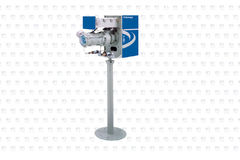
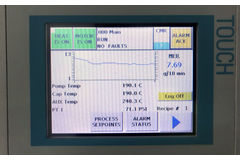
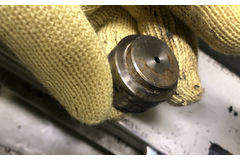
 The rheometer samples molten polymer from the process through a heated transfer line. A metering pump then drives the polymer melt through a capillary die of accurate diameter and L/D ratio, at a precisely controlled rate. The pressure drop across the die is measured by a Vertex Mercury Free pressure transducer. When the system is run at constant pressure (shear stress) and the flow rate is determined, a continuous measurement of the MFR is obtained. A wide range of accurate inter-changeable capillaries provide the system with high resolution and a broad range of capabilities.
The rheometer samples molten polymer from the process through a heated transfer line. A metering pump then drives the polymer melt through a capillary die of accurate diameter and L/D ratio, at a precisely controlled rate. The pressure drop across the die is measured by a Vertex Mercury Free pressure transducer. When the system is run at constant pressure (shear stress) and the flow rate is determined, a continuous measurement of the MFR is obtained. A wide range of accurate inter-changeable capillaries provide the system with high resolution and a broad range of capabilities. Our high performance RCU combines the rheological properties of a Laboratory Capillary Rheometer with MFI readings delivered by a Melt Flow Indexer. It has been updated with a Siemens S7-1500 PLC with a Siemens 7” (178mm), Comfort Panel Touch Screen HMI. This combi-nation provides increased processing power and hi-end graphics enabling the RCU to provide +/- .5% Full Scale Accuracy. This allows the RCU to better align measure-ments with those taken from laboratory instruments. Furthermore, it is certified for hazardous environments as needed. The RCU will allow for up to 7 analog outputs and 8 digital outputs- see more information in specification chart.
Our high performance RCU combines the rheological properties of a Laboratory Capillary Rheometer with MFI readings delivered by a Melt Flow Indexer. It has been updated with a Siemens S7-1500 PLC with a Siemens 7” (178mm), Comfort Panel Touch Screen HMI. This combi-nation provides increased processing power and hi-end graphics enabling the RCU to provide +/- .5% Full Scale Accuracy. This allows the RCU to better align measure-ments with those taken from laboratory instruments. Furthermore, it is certified for hazardous environments as needed. The RCU will allow for up to 7 analog outputs and 8 digital outputs- see more information in specification chart.





